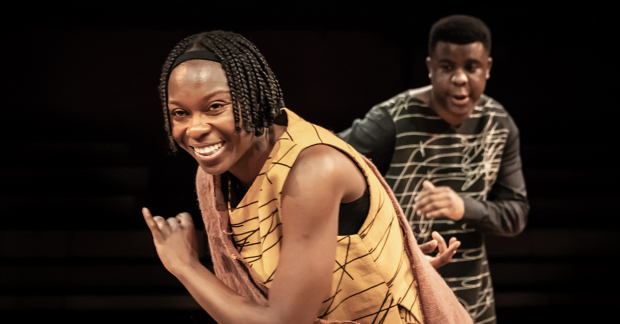Changing Destiny at the Young Vic – review

© Marc Brenner
We're so used to hearing the stories of the ancients Greeks and early Christians, to reading their dilemmas into our lives today. So it's fascinating suddenly to encounter Ben Okri's version of Sinuhe, a 4000-year-old poem from ancient Egypt, and to recognise that the questions it poses are remarkably similar.
The story of the young warrior Sinuhe, forced into exile when he is falsely suspected of conspiring to kill a corrupt Pharaoh, suffering the slings and arrows of fortune as a refugee in other lands, encountering both acceptance and hostility, and longing all the while for his homeland, recalls texts as varied as Hamlet, The Odyssey and Oedipus Rex. Okri has deliberately shaped it into an African saga, making sure in his prologue that the audience remembers that this "mother civilisation" is "the initiation chamber for future civilisations" but its universal resonance is loud.
Director Kwame Kwei-Armah opts for a direct and simple staging. Architect David Adjaye provides a set of two pyramids, one inverted and on top of the other. The one beneath unfolds to provide the playing area; the one above is illuminated by images that range from the shifting sands of deserts, to the faces of Sinuhe's accusers, to hieroglyphics recording his journey through different lands.
It's starkly effective, enhanced by Jackie Shemesh's bold lighting, which turns a strip of stage into a sward of green, or a threatening arena for a shadow fight, and by XANA's sound design which sets voices echoing around the auditorium. Tunde Jegede's music and Rachael Nanyonjo's movement are both perfectly pitched, heightening emotion without ever becoming too intrusive.
It all starts a bit slowly, with the two actors – Joan Iyiola and Ashley Zhangazha – embarking on a game of rock/paper/scissors to discover who takes the role of Sinuhe and who plays his separated soul – and a host of other characters. The early part of the narrative is confusing too; it doesn't establish why we should care about this particular man or why he runs when he is not guilty of anything.
But as it unfolds and explains itself, it exerts a more and more powerful grip, infinitely helped by the communicative and attractive presence of the two actors. In the performance I saw Iyiola played Sinuhe, while Zhangazha took on multiple roles, with simple changes of costume making the switches clear. Both embody action beautifully: Zhangazha becomes an old king by dint of simply bending his knees and standing with his legs a little apart; Iyiola expresses her sorrow by seeming to let pain run through her body, making it a physical sense.
Sometimes Okri's text becomes a little too emphatic – he has made his point about the mistreatment of foreigners long before he makes Sinuhe voice it – but the deeper themes of the play, about the need for each person to be true to themselves, shine through. At just over an hour, the evening doesn't outstay its welcome; has a freshness and a warmth that make it the perfect re-entry point for the Young Vic's return.
It will play to full audiences, but there are also socially distanced performances available to book. Either way it is a quiet assertion of the simple hold a story can exert – from the ancient Egyptians to our hearts.










